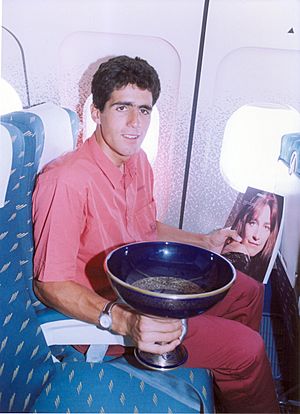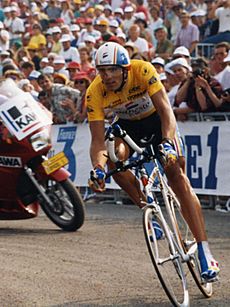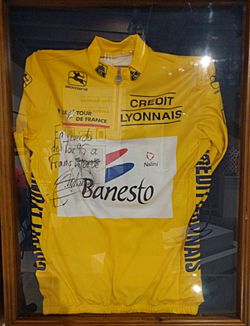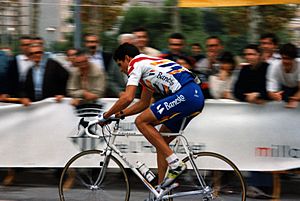Miguel Induráin facts for kids
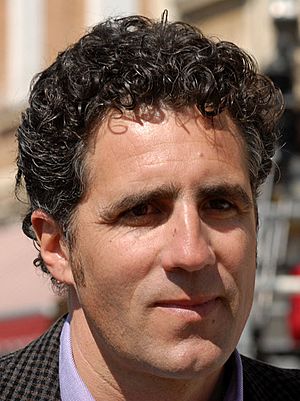
Induráin in 2009
|
|||
| Personal information | |||
|---|---|---|---|
| Full name | Miguel María Induráin Larraya | ||
| Nickname | Miguelón Big Mig |
||
| Born | 16 July 1964 Villava - Atarrabia, Navarre, Spain |
||
| Height | 1.86 m (6 ft 1 in) | ||
| Weight | 76 kg (168 lb; 12 st 0 lb) | ||
| Team information | |||
| Current team | Retired | ||
| Discipline | Road | ||
| Role | Rider | ||
| Rider type | All-rounder | ||
| Major wins | |||
|
|||
Miguel Induráin Larraya (born 16 July 1964) is a famous retired Spanish cyclist. He is known for winning the Tour de France five times in a row, from 1991 to 1995. He is the only person to win the Tour de France five times consecutively.
Miguel also won the Giro d'Italia twice. He is one of only seven cyclists to win both the Giro and the Tour in the same year. He wore the special yellow jersey in the Tour de France for 60 days! He shares the record for most Tour de France wins with other cycling legends like Jacques Anquetil, Bernard Hinault, and Eddy Merckx. In 1993, he almost won cycling's "Triple Crown." This means winning the Giro, the Tour, and the World Championship in the same year. He won the Giro and Tour but finished second in the World Championship by just 19 seconds.
Because of his amazing skills and strong build (186 cm tall and 76 kg), people called him "Miguelón" or "Big Mig." He was very talented from a young age. He was the youngest rider to win the Spanish amateur national road championship at 18. At 20, he was the youngest to lead the Vuelta a España race. He also won a stage in the Tour de l'Avenir when he was 20.
Contents
Early Life and First Races
Miguel Induráin was born in a small village called Villava. This village is now part of Pamplona. He grew up with three sisters and a brother, Prudencio Induráin, who also became a professional cyclist. Miguel got his first bike, a green secondhand Olmo, for his 10th birthday. When he was 11, it was stolen. He worked hard with his father in the fields to earn money for a new one.
Before cycling, Miguel tried many sports like running, basketball, and football. He played these from age nine to 14. Then, he joined a local cycling club called CC Villavés. His first bike race was in July 1978. He finished second in that race. After that, he raced every week. His cycling hero was Bernard Hinault. At 18, he became the youngest person to win the national amateur road championship.
Becoming a Professional Cyclist
In 1984, Miguel competed in the Olympic Games in Los Angeles. After the Olympics, he became a professional cyclist on September 4. Just one week later, he won his first professional race. This was a time trial in the Tour de l'Avenir. In 1985, he started the 1985 Vuelta a España. He came second in the first part of the race, called the prologue. This made him the youngest rider ever to lead the Vuelta. He also rode in the Tour de France that year, which he would do for the next 11 years. However, he had to leave the race early in his first Tour.
In 1986, Miguel rode the Tour again but left on the 12th stage. In 1987, he started the 1987 Vuelta a España even though he had bronchitis. In the 1988 Tour de France, he rode as a teammate for Pedro Delgado, who won the race. In 1989, Miguel broke away from the main group during the ninth stage of the Tour de France. He won that stage and briefly led the mountains competition. In 1990, he rode the Tour de France again to help Delgado. Delgado did not win, but Miguel finished 10th overall. He often waited for Delgado, which meant he gave up better positions for himself.
Miguel was especially good at time trials. These are races where cyclists ride alone against the clock. He would gain a lot of time on his rivals in these stages. Then, he would ride carefully in the mountain stages to keep his lead. During his five Tour de France wins, he never won a stage that wasn't a time trial. His strong time trial skills were perfect for the Tours of that time, which had many long time trial sections.
Winning the First Tour: 1991
In 1991, Greg LeMond was expected to win the Tour de France. Miguel was a great time trialist, but many thought he was too big to be a good climber. LeMond was leading the race until stage 12. But on stage 13, in the mountains, LeMond struggled and lost more than seven minutes to Miguel. Miguel took the lead and kept it until the end, winning his first Tour de France.
Double Victory: Tour and Giro in 1992
Miguel won the first part of the 1992 Tour in San Sebastián. He took the yellow jersey but lost it the next day. In stage nine, a 65 km time trial, Miguel finished three minutes ahead of the second-place rider. He even caught Laurent Fignon, who had started six minutes before him! The 1992 Tour also had a long breakaway by Claudio Chiappucci in a mountain stage. Miguel seemed to struggle on the last climb but still finished third. This was enough for him to get the yellow jersey back. From then on, Miguel's strategy was clear: "crush rivals in the time trials and control them in the mountains."
He also won the Giro d'Italia in 1992. He won an early time trial. Then, in stage 9, he gained a big lead by finishing with the top group on a mountain climb. He won the Giro by over five minutes and also won the final time trial stage.
Another Double Win: Tour and Giro in 1993
Miguel raced the 1993 Tour de France with the same strategy. He won the prologue. He then waited until stage nine, a 59 km time trial, to take control of the race. He won that stage by more than two minutes. After that, he rode defensively, watching his rivals. Some people said his riding was not very exciting, but he was very effective.
He also won the 1993 Giro d'Italia again, completing another Giro-Tour double.
Tour Victory and Hour Record: 1994
In the 1994 Tour de France, Miguel again won the first time trial. He beat Tony Rominger by two minutes. He also attacked in the Pyrenees mountains. He sped up at the bottom of a 10 km climb. Other strong riders stayed with him, but his rivals, like Rominger, were left behind. Miguel didn't win that stage, but he kept the yellow jersey until the end of the Tour.
In 1994, Miguel set a new world hour record. He rode 53.040 km in one hour, beating the previous record held by Graeme Obree.
He tried to win the Giro again in 1994 but was beaten by Evgeni Berzin and Marco Pantani.
In May 1994, Miguel had a test result for a substance called salbutamol. This substance is found in asthma inhalers. Both the IOC (Olympics) and UCI (cycling's main group) allowed athletes with asthma to use it. However, in France, it was completely banned. The IOC and UCI agreed that Miguel would not be punished. They accepted that he used it legitimately for his breathing due to asthma.
Fifth Tour Victory: 1995
Miguel also won the Critérium du Dauphiné Libéré in 1995.
In the 1995 Tour de France, Miguel attacked in stage seven. He and Johan Bruyneel rode away from the main group, leaving them 50 seconds behind. The next day, Miguel won the first time trial. This showed his strength and control. He rode a very smart race, without mistakes or weak moments. This was his fifth and final Tour de France victory.
He also won the world time trial championship in 1995.
Aiming for a Sixth Tour: 1996
Miguel also won the Critérium du Dauphiné Libéré in 1996.
In the 1996 Tour de France, Miguel hoped to win for a sixth time. But he struggled from the start. He finished seventh in the prologue. After getting bronchitis in a cold and wet first week, he started losing time from stage seven. He said his legs felt strange on a climb, and he lost three minutes quickly. He finished 11th overall in that Tour.
However, Miguel won the individual time trial at the 1996 Olympic Games in Atlanta. This was the first time professional cyclists could compete in the Olympics. He won the gold medal ahead of Abraham Olano and Chris Boardman. When asked if he would trade his gold medal for a sixth Tour victory, he said yes. He explained that winning the Tour is the most important thing for a professional cyclist, while an Olympic title is more symbolic. In the road race, he finished 26th.
In September 1996, Miguel rode the 1996 Vuelta a España because his team wanted him to. But he unexpectedly dropped out of the race. His relationship with his team manager had become difficult.
Retirement from Cycling
Miguel took two months to think about his future. Some teams offered him a lot of money to keep racing. But on January 1, 1997, he announced that he would not race again. He told journalists that it was a decision he thought about deeply. He said he was still physically able to win a sixth Tour. But he felt it was time to stop and spend more time with his family. He read a statement and then left without answering questions.
Today, Miguel divides his time between his hometown of Pamplona and his house in Palma de Mallorca. He is married to Marisa, and they have three children. In 1998, he started the Miguel Induráin Foundation. This foundation helps promote sports in his home region of Navarra. He has also worked with the Spanish Olympic Committee and the Union Cycliste Internationale. He still rides his bike three or four times a week. He also attends cycling events for fun, like L'Étape du Tour.
Amazing Physical Abilities
Scientists at the University of Ferrara studied Miguel Induráin. They found that his body was incredibly strong. His blood could carry 7 liters of oxygen per minute. For comparison, an average person carries 3-4 liters, and other top cyclists carry 5-6 liters. His heart could pump 50 liters of blood per minute, while a fit amateur cyclist's heart pumps about 25 liters. Miguel's lung capacity was 7.8 liters, which is much higher than the average of 6 liters. His resting heart rate was very low, sometimes as low as 28 beats per minute. This meant his heart was less stressed during tough mountain climbs. His VO2 max (how much oxygen his body can use) was 88 ml/kg/min. This is very high compared to other athletes.
He worked with an Italian professor starting in 1987. Under his guidance, Miguel's weight dropped from 85 kg to 78 kg. This helped him become a more all-around rider. He was 10 kg lighter than when he was a junior cyclist.
Even 14 years after he retired, at age 46, Miguel's physical abilities were still impressive. Tests showed his body was still very fit. His oxygen uptake and power output were still similar to active professional cyclists.
Personality and Legacy
Miguel Induráin was a very humble and quiet person. He never thought he was better than anyone else. He didn't like being in the spotlight, even when he wore the yellow jersey. A journalist once wondered if his wife truly knew him because he was so reserved. A teammate said you could barely hear him move his chair at mealtime.
His five straight Tour de France wins were important for Spain. They happened as Spain was becoming a more confident country after many years of strict rule. Miguel's face became a symbol of this new, strong Spain.
He was called a "robotic athlete" because of how perfectly he dominated time trials. He was compared to Jacques Anquetil, another great time trialist. Cycling Weekly magazine wrote that he seemed to do everything slowly, even off the bike, as if saving energy. But his steady gaze showed he was a great rider.
Miguel said the person who impressed him most was Pope John Paul II. He gave the Pope a yellow jersey from the Tour de France and a pink jersey from the Giro d'Italia. It's rare for Miguel to give away his cycling items, which shows how special this gift was.
Miguel Induráin is a member of the Laureus World Sports Academy. This group includes many of the world's greatest athletes.
Awards and Honors
 Prince of Asturias Award for Sports
Prince of Asturias Award for Sports Grand Cross of the Royal Order of Sporting Merit
Grand Cross of the Royal Order of Sporting Merit Grand Cross of the Order of Civil Merit
Grand Cross of the Order of Civil Merit French Legion of Honour
French Legion of Honour Olympic Order
Olympic Order
Career Achievements
Major Race Wins
- 1983
- 1st
Road race, National Amateur Road Championships
- 1984
- 1st Stage 10 (ITT) Tour de l'Avenir
- 1985
- Tour de l'Avenir
- 1st Stages 6a & 10 (ITT)
- 1986
- 1st
 Overall Tour de l'Avenir
Overall Tour de l'Avenir
- 1st Prologue & Stage 9 (ITT)
- 1st
 Overall Vuelta a Murcia
Overall Vuelta a Murcia
- 1st Prologue
- 1987
- 1st
 Overall Vuelta a los Valles Mineros
Overall Vuelta a los Valles Mineros
- 1st Stages 2, 3 & 5
- 1st GP Navarra
- 1st Prologue Vuelta a Murcia
- 1st Stage 1 Volta a Galicia
- 1988
- 1st
 Overall Volta a Catalunya
Overall Volta a Catalunya
- 1st Stage 6a (ITT)
- 1st Stage 4a Vuelta a Cantabria
- 1989
- 1st
 Overall Paris–Nice
Overall Paris–Nice - 1st
 Overall Critérium International
Overall Critérium International
- 1st Stage 3 (ITT)
- 1st Stage 9 Tour de France
- 1990
- 1st
 Overall Paris–Nice
Overall Paris–Nice
- 1st Stage 6
- 1st Clásica de San Sebastián
- 1991
- 1st
 Overall Tour de France
Overall Tour de France
- 1st Stages 8 (ITT) & 21 (ITT)
- 1st
 Overall Volta a Catalunya
Overall Volta a Catalunya
- 1st Stage 5 (ITT)
- 1st
 Overall Tour du Vaucluse
Overall Tour du Vaucluse
- 1st Stage 2
- 1992
- 1st Overall UCI Road World Rankings
- 1st
Road race, National Road Championships
- 1st
 Overall Tour de France
Overall Tour de France
- 1st Prologue, Stages 9 (ITT) & 19 (ITT)
- 1st
 Overall Giro d'Italia
Overall Giro d'Italia
- 1st
 Overall Volta a Catalunya
Overall Volta a Catalunya - 1st Boucles de l'Aulne
- 1st Stage 1a (ITT) Vuelta Castilla y Leon
- 1993
- 1st Overall UCI Road World Rankings
- 1st
 Overall Tour de France
Overall Tour de France
- 1st Prologue & Stage 9 (ITT)
- 1st
 Overall Giro d'Italia
Overall Giro d'Italia
- 1st Stages 10 (ITT) & 19 (ITT)
- 1st
 Overall Vuelta Castilla y Leon
Overall Vuelta Castilla y Leon
- 1st Stage 1a
- 1st Clásica a los Puertos de Guadarrama
- 1st Stage 6 (ITT) Vuelta a Murcia
- 1994
- Best human effort:
 53.040 km
53.040 km - 1st
 Overall Tour de France
Overall Tour de France
- 1st Stage 9 (ITT)
- 1st
 Overall Tour de l'Oise
Overall Tour de l'Oise
- 1st Stage 4 (ITT)
- 1st Stage 3 Vuelta Castilla y Leon
- 1995
- UCI Road World Championships
- 1st
 Overall Tour de France
Overall Tour de France
- 1st Stages 8 (ITT) & 19 (ITT)
- 1st
 Overall Critérium du Dauphiné Libéré
Overall Critérium du Dauphiné Libéré
- 1st Stage 3 (ITT)
- 1st
 Overall Grand Prix du Midi Libre
Overall Grand Prix du Midi Libre - 1st
 Overall Volta a Galicia
Overall Volta a Galicia
- 1st Stage 1
- 1st
 Overall Vuelta Ciclista a La Rioja
Overall Vuelta Ciclista a La Rioja
- 1st Stage 1a
- 1st Stage 5a Vuelta a Aragón
- 1996
- 1st
 Time trial, Olympic Games
Time trial, Olympic Games - 1st
 Overall Critérium du Dauphiné Libéré
Overall Critérium du Dauphiné Libéré
- 1st Stages 5 (ITT) & 6
- 1st
 Overall Volta ao Alentejo
Overall Volta ao Alentejo
- 1st Prologue & Stage 4
- 1st
 Overall Vuelta a Asturias
Overall Vuelta a Asturias
- 1st Prologue
- 1st
 Overall Euskal Bizikleta
Overall Euskal Bizikleta
- 1st Stage 5
Grand Tour Results
| Grand Tour general classification results | |||||||||||||||
| Grand Tour | 1985 | 1986 | 1987 | 1988 | 1989 | 1990 | 1991 | 1992 | 1993 | 1994 | 1995 | 1996 | |||
|---|---|---|---|---|---|---|---|---|---|---|---|---|---|---|---|
| — | — | — | — | — | — | — | 1 | 1 | 3 | — | — | ||||
| DNF | DNF | 97 | 47 | 17 | 10 | 1 | 1 | 1 | 1 | 1 | 11 | ||||
| 84 | 92 | DNF | DNF | DNF | 7 | 2 | — | — | — | — | DNF | ||||
| Major Stage Race Results | |||||||||||||||
| Race | 1985 | 1986 | 1987 | 1988 | 1989 | 1990 | 1991 | 1992 | 1993 | 1994 | 1995 | 1996 | |||
| — | — | — | 42 | 1 | 1 | — | 3 | — | 35 | — | — | ||||
| — | — | — | — | — | — | 43 | — | — | — | — | — | ||||
| — | 22 | — | — | — | 3 | — | — | 54 | — | — | — | ||||
| — | — | — | — | — | — | — | 2 | 15 | 35 | — | — | ||||
| — | — | — | — | — | — | — | — | — | — | 1 | 1 | ||||
| — | — | — | — | 10 | — | — | — | — | — | — | — | ||||
| — | — | DNF | 1 | 10 | — | 1 | 1 | 4 | — | — | — | ||||
| — | Did not compete |
|---|---|
| DNF | Did not finish |
See also
 In Spanish: Miguel Induráin para niños
In Spanish: Miguel Induráin para niños
 | DeHart Hubbard |
 | Wilma Rudolph |
 | Jesse Owens |
 | Jackie Joyner-Kersee |
 | Major Taylor |


